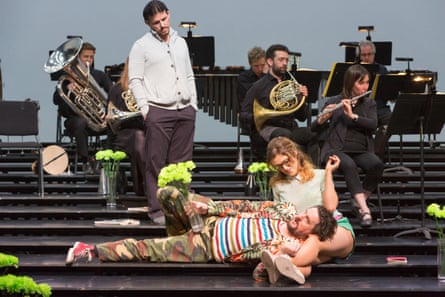Countless one-liners capture the essence of Oscar Wilde’s The Importance of Being Earnest without recourse to an item of luggage (clue: 7 letters beginning with H). One of the best is Lady Bracknell’s to Cecily Cardew: “There are distinct social possibilities in your profile,” she pronounces, having discovered the wretched girl is worth a hundred and thirty thousand pounds and therefore decidedly more fascinating that she was a minute ago. Money talks, or in Lady Bracknell’s case swoons, caresses, screams, shrieks, abandons all vestige of musical pitch and bursts out into a fortissimo volley of high-pitched German as if addressing a rally, having earlier led the assembly in her own aberrant version of Schiller’s Ode to Joy.
In Gerald Barry’s 2011 opera, revived at the Barbican theatre in the Royal Opera House’s Linbury Studio production, Lady Bracknell is played by a man. The composer instructs the singer, a bass, to wear a dark suit and avoid hamming: “Less is more in this situation. The music and text do not need camp decoration. To feminise the role in this way can emasculate it, and make it less.” Barry issues many such instructions in his score. The 48 dinner plates that have to be smashed must be white and not less than 27cm in diameter. The telephone should be the kind found in Hitchcock films. Megaphones used by Cecily and Gwendolen must be the hand-held variety. When the big hammer strikes, it needs to sound as it does in Berg’s Three Orchestral Pieces. The gun should be a starting pistol, and fire like the revolver in Satie’s Parade. And so on. Comedy lives or dies by detail and timing. Barry is spot-on with both.

Born in County Clare in 1952, a pupil of Stockhausen and Kagel, he has written five operas. The Intelligence Park and The Bitter Tears of Petra von Kant were best known until The Importance of Being Earnest – commissioned by the Los Angeles Philharmonic Orchestra, Gustavo Dudamel (named in the score) and the Barbican – catapulted the composer to wider fame. First seen in the UK in concert in 2012, it was an immediate hit and that rare thing: a genuinely funny opera, as zany and compact as Puccini’s Gianni Schicchi but with a smaller cast and ensemble, filling a whole evening and therefore easier to mount. Demands for its staging met with an instant and multiple response: first the Opéra national de Lorraine, then Ramin Gray’s for the ROH (now at the Barbican) and a touring version by NI Opera.
The composer has written his own libretto, a savage but faithful precis of the original with the tedious bits excised. Humour is forged out of crisp words and witty music working as one. Imagine Wilde’s reduced text fed into a shredder and reconstituted, all the usual rhythms and metres of speech flattened into equal syllabic components, as in “I-can-pro-duce-the-hand-bag”. Vocal lines are supported and coloured by quirky instrumental pairings. Contrabassoon and bassoon, trombone and tuba grunt eloquently. Trumpets and horns rally with the kind of sardonic fanfares Shostakovich would have loved. Flute and oboe offer wry, spiky comment. The rapid speeds – Barry often instructs the players not to slow down – allow for no longueurs.
The cast is full of natural comedians: Benedict Nelson warm-voiced and enchanting as the mildly flaky Algernon, persuasive even when lying on the floor with Cecily’s foot on his ear; Paul Curievici, clean-toned and properly silly as Jack; Stephanie Marshall cool and articulate as Gwendolen; Claudia Boyle a pert, hip-wagging Cecily with perfect control in this high-flying role. Alan Ewing’s Lady Bracknell, and Hilary Summers’s Miss Prism, Simon Wilding as Lane/Merriman and Kevin West in the speaking role of the Rev Chasuble complete a classy lineup, clambering up and down the stage, throwing cakes, muffins, bread and butter with beautifully mannered buffoonery.
In Gray’s sharp staging, designed by Ben Clark as a tiered box with no escape, singers sit in the front row with the audience when offstage. The stage is shared by the musicians, the expert Britten Sinfonia conducted by Tim Murray, in full view and at times required to shout and stamp their feet. Barry’s career rather languished for a while. No longer. He always had advocates, especially his fellow composers. It’s touching to note that Thomas Adès conducted Earnest’s concert world premiere in Los Angeles, while Huw Watkins played piano and celeste at the Barbican: tribute indeed. Watch this production, live-streamed last night, on YouTube and available until the end of the month.
We expect opera to be sung from memory, but not choral music. The Monteverdi Choir and soloists, directed as ever by John Eliot Gardiner, took the risk with Bach’s St Matthew Passion and excelled. After touring several European cities, including Brussels within hours of the bombing, they arrived at the Barbican for a performance as reflective and nuanced as it was expressive. Young soloists from the choir – notably sopranos Hannah Morrison, Amy Carson, altos Eleanor Minney, Clare Wilkinson, countertenor Reginald Mobley, tenor Hugo Hymas and several good basses – made each contribution distinctive and characterful. The boys of Trinity Boys Choir, Croydon (director David Swinson, evidently a magician) sang with well-drilled refinement, and not a fidget or a yawn.
As Christus, Stephan Loges was so poised and velvet-toned you wished only that the part was larger. Mark Padmore sang the Evangelist with that curiosity, variety and fervour that makes him the best around. The English Baroque Soloists hosted their own fine soloists: violinists Kati Debretzeni and Catherine Martin, gamba player Reiko Ichise and oboist Michael Niesemann among the many. Look out for them. These are remarkable musicians, chasing between ensembles, going wherever the work is. Baroque music has its own shy stars.

Comments (…)
Sign in or create your Guardian account to join the discussion